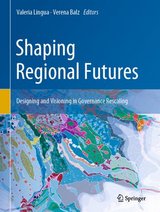Lukas Gilliard, Fabian Wenner, Alain Thierstein and Nadia Alaily-Mattar, team members and PhD students at the Chair of Urban Development, have published a new book chapter titled "The Transformative Capacity of Regional Design". The contribution by is part of the edited book "Shaping Regional Futures - Designing and Visioning in Governance Rescaling", edited by Valeria Lingua und Verena Balz, and published by Springer.
The book discusses the roles of regional designing and visioning in the formation of regional territorial governance. It aims to increase our understanding of (1) how the recognition of spatial dynamics and the imagination of spatial futures inform and are informed by planning frameworks and (2) how such design processes influence cooperation and collaboration on planning in metropolitan regions. The book gathers theoretical reflections on these topics and illustrates them through practical experiences in several European countries. The book appeals to a community of readers with an interest in experimental strategic spatial planning. It is innovative in the way it associates this interest with knowledge from the design field.
The chapter discusses how regional design introduces a transformative perspective on spatial development. It argues that regional design complements statutory regional planning within the setting of governance processes and that it represents a new methodology emerging as a reaction to the current political inability to re-scale unfit governance structures, with the objective of more effectively steering the development of metropolises. The proposition of a design exercise at regional scale shifts the discourse from issues of formal governmental reorganisation towards methodologies for imagining alternative spatial futures. It does so by proposing a complementary method for formulating regional plans that is interdisciplinary and design-based, similar to urban design but on a wider spatial scale. Design as a process of synthesising can identify and visualise future regional development challenges and convey the need for spatial interventions. The chapter argues that regional design is, therefore, a problem-solving as well as a problem-finding methodology, which should be impact-oriented and strategic. It should operationalise the inter-scalar, relational notion of space. The product of the regional design exercise should encourage debate rather than present an end solution or a master plan. It is, however, complicated by the multiple knowledge domains involved in this process, as well as by extensive, multi-scalar actor networks, fuzzy responsibilities and complex interrelations.
The book content is digitally available on the Springer website, it can also be ordered here.
